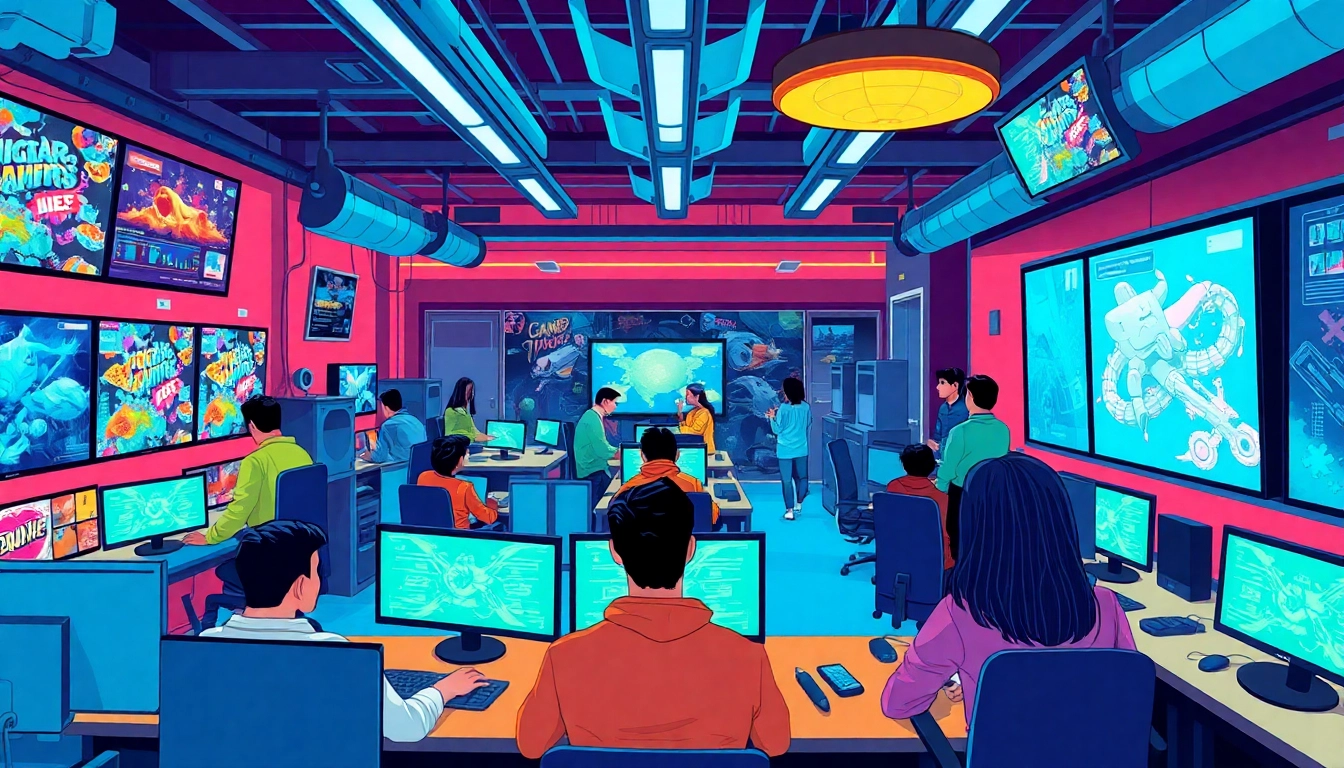Understanding Game Studios: The Core of Game Development
What Defines a Game Studio?
A game studio is an organization entirely dedicated to creating video games, encompassing a variety of roles including design, programming, art, and sound creation. At its core, a game studio transforms creative concepts into interactive experiences, combining technology and storytelling to engage players. These studios can range from independent entities producing small-scale, innovative games to large corporations that create blockbuster titles. Game studios operate under differing models, often affecting their development processes, cultural dynamics, and end products.
The Evolution of Game Studios Over Time
Since the inception of video games in the 1970s, game studios have evolved exponentially in terms of technology, production values, and complexity. Early developers worked in small teams, often multitasking across varied disciplines. As the industry matured, the emergence of larger studios led to specialization, with clearly defined roles such as game designers, developers, artists, and audio engineers. The proliferation of personal computers and gaming consoles fostered competition and innovation, with studios adapting to rapidly changing technologies and player expectations.
Key Roles Within Game Studios
Game studios boast a diverse array of roles critical to the development lifecycle of a video game. Key positions typically include:
- Game Designer: Crafts the game’s mechanics and rules, focusing on concept creation and player experience.
- Programmer: Writes code to bring the game to life, handling technical tasks from artificial intelligence to graphics rendering.
- Artist: Creates visual elements, including characters, environments, and animations, key to the game’s aesthetic appeal.
- Sound Designer: Develops audio elements, from sound effects to voice acting, enhancing the ambiance and immersion of the game.
- Producer: Manages the project timeline and budget, ensuring communication across departments and that project goals are met.
The Landscape of Game Studios in 2025
Top Tier Game Studios to Watch
As of 2025, certain game studios stand out for their innovative contributions to the gaming industry. Notable examples include:
- Epic Games: Renowned for *Fortnite* and Unreal Engine, they continuously push the envelope in both game development and gaming technology.
- CD Projekt Red: Recognized for their narrative-heavy titles, particularly *The Witcher* series and *Cyberpunk 2077*, they exemplify growth and evolution in storytelling and world-building.
- Bethesda Game Studios: Famous for immersive open-world games such as *Skyrim* and the *Fallout* series, they focus on extensive lore and player freedom.
Emerging Indie Game Studios Making an Impact
While large studios capture significant market share, indie developers also play a pivotal role in the gaming ecosystem, often sparking new trends and ideas. Studios such as House House (known for *Untitled Goose Game*) and Supergiant Games (creators of *Hades*) highlight how creativity and innovation can lead to commercial success and critical acclaim, illustrating that ambition does not necessarily correlate with size.
What Sets Successful Game Studios Apart?
Successful game studios tend to share common attributes that set them apart in a crowded marketplace. These include:
- Strong Leadership: Effective studios have leaders who inspire creativity, foster collaboration, and maintain a clear vision.
- Creative Culture: A studio that encourages experimentation and values diverse perspectives often leads to innovative products.
- Player-Centric Focus: Understanding and responding to player feedback is crucial, as studios that prioritize user experience tend to achieve greater satisfaction and loyalty.
Challenges Faced by Game Studios Today
Financial Constraints in Game Development
Financial constraints remain a significant challenge for many game studios, particularly indie developers. Securing funding can be a precarious endeavor, often leading to sacrifices in game quality or stretching development timelines. Successful studios mitigate this by creating budget projections and seeking early investments or crowdfunding.
Retention of Creative Talent in Game Studios
The gaming industry is characterized by intense competition for talent. High turnover rates can disrupt projects and diminish studio culture. To combat this, studios are increasingly focusing on employee satisfaction through initiatives that promote work-life balance, diverse representation, and continuous professional development.
Navigating Changing Consumer Preferences
The gaming market is ever-evolving, influenced by technological advancements and shifting player demographics. Game studios must remain agile, adapting strategies that align with emerging trends such as live-service models, mobile gaming, and the integration of social features. Analyzing player data and leveraging analytics tools can give studios insight into preferences and behavior, helping to drive design and marketing initiatives.
Best Practices for Managing Game Studios
Creating an Inclusive Culture in Game Studios
Building an inclusive culture is critical for fostering creativity and innovation. Diverse teams bring varied perspectives, leading to more relatable characters and narratives. Game studios should implement hiring practices that prioritize diversity and ensure that all voices are heard throughout the development process.
Adopting Agile Methodologies for Effective Development
Agile methodologies promote flexibility and adaptability within game studios, essential in an industry marked by rapid change. By employing iterative development methods and regular feedback cycles, studios can respond to challenges and refine their products based on real-time input, ultimately leading to enhanced product quality and team efficiency.
Strategies for Streamlining Collaboration in Game Studios
Effective collaboration is vital for the success of game development projects. Implementing tools that facilitate communication and project tracking can resolve issues related to remote work, time zone differences, and team dynamics. Platforms like Jira and Slack help improve transparency and accountability across teams, leading to smoother workflow management.
The Future of Game Studios and Emerging Trends
Integrating Virtual Reality in Game Studios
Virtual reality (VR) technologies are reshaping the gaming landscape, offering immersive experiences that engage players in unprecedented ways. Studios that incorporate VR into their development processes open new pathways for storytelling, puzzle-solving, and social interaction within games. Understanding player adaptability and hardware limitations is pivotal to successful VR implementation.
The Rise of Cloud Gaming and Its Impact on Game Studios
Cloud gaming is revolutionizing the industry by allowing players to access games remotely, expanding player bases and mitigating hardware barriers. Studios must adapt by optimizing resource allocation and considering new marketing strategies that focus on subscriptions or service-based models.
How AI is Shaping Game Development in Studios
Artificial intelligence (AI) is gradually becoming an integral part of game development, enhancing everything from NPC behavior to game testing. By leveraging machine learning algorithms, developers can create more complex interactions and tailor difficulty based on player performance. The integration of AI not only accelerates development but also enhances player engagement and satisfaction.









